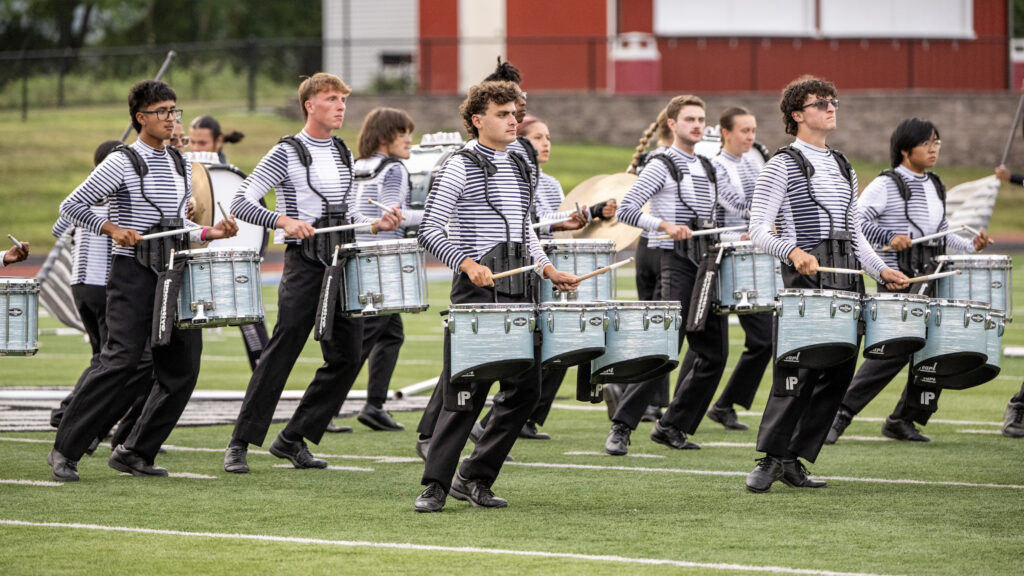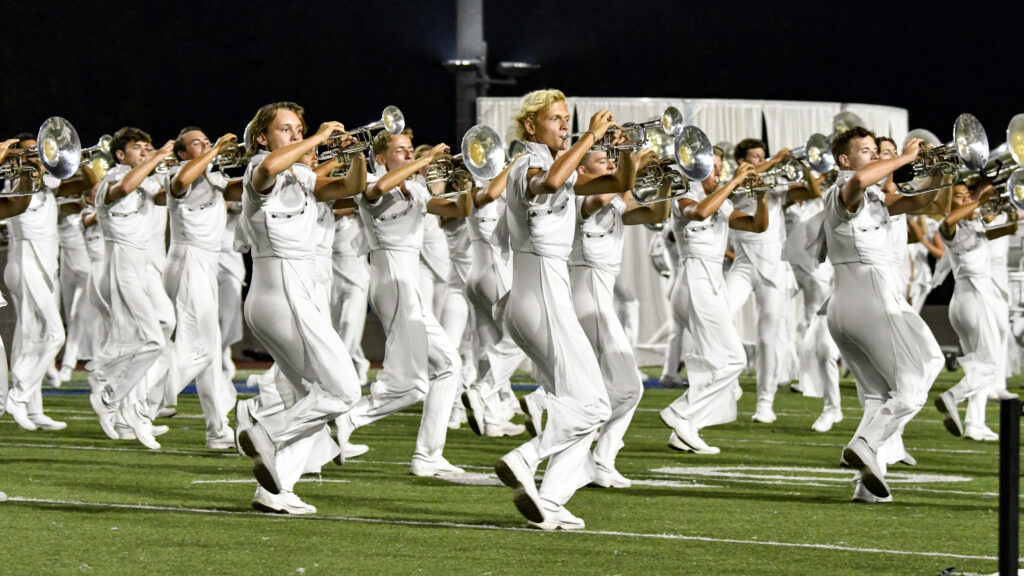Bill Dejournett is assistant director of bands at the University of Mississippi. Here are his thoughts on drum corps.
My college band experience was at Jacksonville State University in Alabama, the current home of both the Marching Southerners band and Spirit. At that time, we were fortunate to have a band director, Dr. David L. Walters, who not only liked drum corps but also encouraged it among his members. While at JSU, we had many corps represented within the band program, including Spirit of Atlanta, Southwind, Suncoast Sound, Star of Indiana, Garfield Cadets, the Cavaliers, Phantom Regiment, Madison Scouts, Blue Devils and Santa Clara Vanguard. Walters, a wonderful musician and fine human being, always had a “pat” answer to any question regarding a student participating in corps: “You should go march in the bugle corps, because when you do, you bring that experience back to the Southerners. Over the years, I went from experiencing college band and drum corps from the student perspective to the teacher’s perspective. As a college band director, my students have participated in Blue Knights, Carolina Crown, the Cavaliers, Madison Scouts, Spirit, Phantom Regiment, Southwind, Memphis Sound and Mandarins. Little has changed in my views of both college band and drum corps over the 16 years since I aged out. The benefits of the college band student marching in a corps are obvious and numerous. The corps student comes back to the band with the ability to learn music, drill, and guard work quickly and efficiently. The marching technique of these students is impeccable and their work ethic is at an extremely high level. From a brass player’s standpoint, the corps students come back with a great understanding of breath support and endurance and are typically the strongest players in their sections. I don’t recall ever having a corps student complain about it being too hot, the drill being too hard, practicing too much or any other similar comment which we as directors try to discourage whenever possible. I frequently make use of the following drum corps anecdote from a few years before I started marching. In the early 1980s, the drum bus for Spirit of Atlanta (nicknamed “Fort Dix”) broke down for the first time on tour. A rookie in the corps started complaining. A veteran got in his face and calmly stated, “And by complaining about it, how have you helped to improve the situation?” I always tell my bands that despite exhaustive planning by the staff for every possible problem on a trip, there will inevitably be something small go wrong, and they should remember that comment by the veteran when that happens. The greatest thing corps members bring back to their college bands is leadership by example. Not only do the other students in the band see and hear their excellence in performance, but it also motivates them to improve their own marching and playing technique. More importantly, corps members in the college band can have a huge impact on the overall morale of the band. My colleague and mentor, Prof. David Willson (editor’s note: not to be confused with DCI’s Web content manger Dave Wilson), is the director of bands at ‘Ole Miss. He is a bit of an oddity in the ranks of head college band directors in that he enjoys teaching the marching band and still does it, although after his 16 years as a high school director and 14 as a college director, no one would think twice of him saying, “I’ve had enough of this marching band stuff.” He feeds off the energy of the band as they rehearse and enjoys the camaraderie and spirit of the students. One of Willson’s requirements for marching band is that every student brings their music and a pencil to every rehearsal. One day at band rehearsal several years ago, there was a freshman trumpet player from a very small town in Mississippi who didn’t think he really needed it, so he didn’t bring his music to rehearsal. Also in the band that year was a trumpet player from Batesville, Miss., named Brandon Lewis, who just happened to have been a soprano soloist with Blue Devils that past summer. The exchange over the loudspeaker went something like this (the name of the young man has been changed to protect his identity): WILLSON: Mr. Jones, why do you not have your music?
FRESHMAN: I left it in my room, sir.
WILLSON: Mr. Lewis, do you have your music today?
(Brandon Lewis swiftly produces his flip folder and holds it up for all to see.)
WILLSON: Now, Mr. Jones, if a soprano soloist for the Blue Devils can have his music at every rehearsal, don’t you think you can bring yours? This kind of quiet leadership is what corps members can most bring to their college bands to boost the morale of the entire group. A few “pointers” for corps members returning to their college bands: 1. Remember that you are representing your drum corps when you come back to band. Always behave with class. Keep in mind that there are other impressionable people who are going to be making decisions about if and where they are going to march. While you are on tour with your corps, you are expected to behave in a way that will bring positive recognition to your corps while representing them. Keep that mindset at your college band, because you are in effect still representing your corps when you get back home. Make your corps proud. 2. Keep in mind that the typical college band’s mission is not the same as a drum corps’ mission. If you come to your college band expecting 30 pages of drill in the opener and pushus for every error made, you are bound to be disappointed. Remember that a college marching band’s rehearsal time is extremely limited compared to drum corps, and that a college band, for the most part, serves a different “clientele.” While there may be several rabid drum corps fanatics in your band, don’t forget that there are also many “casual” band students who are in it primarily for the camaraderie and family atmosphere more than anything else. 3. Be mindful of your life outside corps and your other responsibilities. Our “local” drum corps here in North Mississippi is the Memphis Sound, a great organization with great people. One of their policies is that your high school or college band performances come first. Take care of those, thene to camp. In extreme situations, we at ‘Ole Miss try to work with student schedules and to be flexible with corps schedules in regards to camps and particularly with summer band camp, but we expect that same flexibility from our students. In 99.9 percent of the cases where there was a schedule conflict, we’ve been able to work something out. Keep the lines of communication open with your college band director. As soon as the winter camp schedule and summer tour schedule comes out, go to your corps director and your band director and discuss any conflicts you might have. In most cases both will more than likely be willing to work with you to resolve the situation. Don’t assume that either will be of the school of thought that, “If you don’t come to camp, you’re cut,” or, “If you don’t come to this game/rehearsal/commencement, you lose your scholarship.”
Remember, early communication is the key! Unfortunately, when I was a band student, I didn’t always follow number 2 as well as I should have. I was extremely cocky and at times arrogant as a band student, which I now regret greatly. I wish now that I had been more open to the guidance and input of other students around me who were fine musicians and people, but just happened to not have had the opportunity or who had chosen not to march in drum corps. As I progressed in college and in drum corps and was placed in leadership positions, I grew to understand this more and more, and I tended to respect my non-drum corps brethren equally, but it took time for me to grow out of that immature, cocky phase that I was in. Overall, I can honestly say that marching drum corps for three seasons and being in my college band were two of the most incredible experiences in my life. I regard both equally for different reasons, as I got something similar — yet different — out of the two. I would encourage any college band student to check out drum corps if your situation allows, and I would encourage any corps member in college who is not involved to check out your band. Both will keep on giving for the long haul, in terms of skills learned and in terms of friendships and memories that will live on for a lifetime.
Michael Boo has been involved with drum and bugle corps since 1975, when he marched his first of three seasons with the Cavaliers.
He has a bachelor’s degree in music education and a master’s degree in music theory and composition.
He has written about the drum corps activity for over a quarter century for publications such as Drum Corps World, and presently is involved in a variety of projects for Drum Corps International, including souvenir program books, CD liner notes, DCI Update and Web articles, and other endeavors.
Michael currently writes music for a variety of idioms, is a church handbell and vocal choir director, an assistant director of a community band, and a licensed Realtor in the state of Indiana. His other writing projects are for numerous publications, and he has published an honors-winning book on the history of figure skating.
His hobbies include TaeKwonDo and hiking the Indiana Dunes.
But more than anything, Michael is proud to love drum corps and to be a part of the activity in some small way, chronicling various facets of each season for the enjoyment of others.





